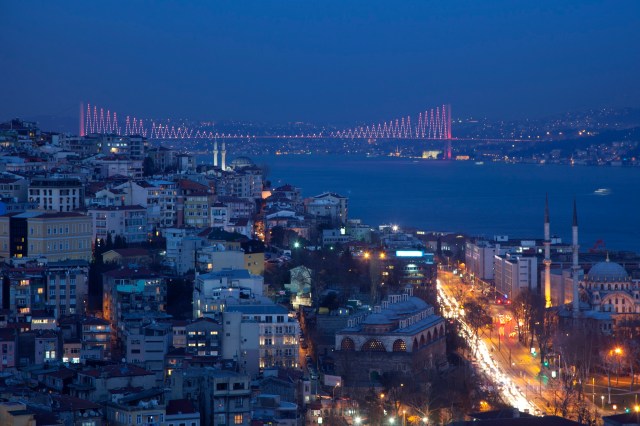Where East meets West: The Bosphorus Bridge which spans between the Asian and European sides of Istanbul (Photo Credit: Getty Images)

In the fantasy world of Game of Thrones, the action takes place on two continents – ‘Westeros’ which is broadly occidental and ‘Essos’ which is broadly oriental. The two are separated by a storm-tossed sea.
Back in the real world, we speak of Europe and Asia as if they were separate continents. However, that too is a work of fantasy. On a map without borders what you see is one continent, not two.
The border between Europe and Asia is arbitrary. One section runs north-south along the Urals, a lengthy but far from insuperable barrier to east-west travel. After the mountains peter out, we switch to the Ural river. That takes us to the Caspian and then the mountains of the Caucasus (but not at their highest ridge line). Moving west, we cross the Black Sea and arrive at the Bosphorus – a line of separation so meagre that it’s not only the same country on both sides, but also the same city (Istanbul).
Is there a more meaningful distinction between Europe and Asia?
Europe was once identified with Christendom. These days, the former seems embarrassed with that old association, while the latter stretches far beyond its former limits. If there aren’t already more practicing Christians in China than Europe, there soon will be.
So what does that leave?
Democracy? Nope, plenty of that in Asia now.
Ancestry? Not when the closely related peoples of the Eastern Mediterranean are divided between three continents.
What about economics and trade? Not anymore, says Bruno Maçães in the Guardian:
“Europe is disappearing. Not because – as you often hear – we are returning to a world of small nations, proud and sovereign, but because Europe is being replaced by a much vaster and more interesting geographic unit: Eurasia, the combination of the two continents of Europe and Asia, stretching from Lisbon to Shanghai or Jakarta. The rise of Asia forces us to place the continents on the same level, no longer separated by different levels of historical development. New connecting infrastructure, trade and the permeability of borders are drawing the whole of Eurasia together.”
As also mentioned in a previous UnPacked, Maçães believes that Brexit Britain needs to embrace the Eurasian future:
“…the UK could yet become one of the most important hinges holding the supercontinent together… Britain can be a driver of economic growth in India, Indonesia and elsewhere in Asia – and greatly benefit from it. With Japan, it can establish privileged partnerships in the development of robotics, AI and self-driving vehicles.
“…While Germany and China head to an inevitable clash about who will lead the next industrial revolution, Britain is in possession of that elusive gold dust that Asian manufacturing powerhouses will be missing for a long time: cutting-edge services and finance.”
It is sometimes hoped – or feared – that Britain outside of the EU will become like Singapore. In this context, the south east Asian republic is a shorthand for barely-regulated, low tax, hyper-capitalism. As well as misrepresenting the real Singapore, such a vision of the future is not what Britain voted for.
Maçães, however, draws out the true lesson of Singapore’s history as an independent state:
“…Singapore was quickly able to replace access to the Malaysian hinterland with trade and investment links with more distant markets. Just as Singapore became an Asian country more deeply connected with Europe and the United States than with its Asian neighbours, Britain could in just a couple of decades vastly expand its links with four of the five largest economies of the 21st century: China, Japan, India and Indonesia.”
It’s a provocative thesis, but if the nations and businesses of Eurasia are to draw closer together, then it’s unlikely to be within the protectionist trade barriers of the European Union. The other big Eurasian powers including China, Japan, Russia and India also have their protectionist tendencies – and some nationalist ones too.
The United Kingdom, however, could provide a very different environment, not so much neutral territory, as an open venue for economic, scientific and cultural exchange.
Maçães asks if “a new Eurasian capital [is] being born on the shores of the Thames?” It’s a good question – and the answer will depend on Britain’s willingness to seize the opportunity.










Join the discussion
Join like minded readers that support our journalism by becoming a paid subscriber
To join the discussion in the comments, become a paid subscriber.
Join like minded readers that support our journalism, read unlimited articles and enjoy other subscriber-only benefits.
Subscribe